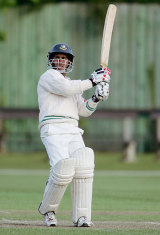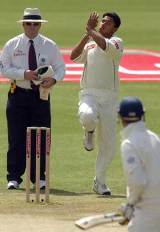Don't crush the Tigers' dream
Help Bangladesh cricket if you can, but if you can't, at least refrain from crushing their dreams, writes Rabeed Imam
Rabeed Imam
11-Jun-2005
|
|

|
Exactly a month ago the Bangladeshis arrived in England. A month can be an awfully long time if you are on a cricket tour and the playing experience, particularly in the trying early summer conditions, is supposed to do a budding Test nation more good than bad. But looking back, it is difficult to fathom the gains so far.
Until their fourth and final innings in the Test series, Bangladesh were invisible. With the batting in tatters, the bowlers, often a matter of pride in their own humble ways, disappointed even more with only Mashrafe Mortaza looking Test class. And then before the Durham Test, all the detrimental aspects surrounding the team, which in good times would just go under the carpet, started surfacing.
Whispers of discord in the team, lack of confidence in the captain and coach, dismay at team selection and grumbling due to the presence and reported interference of officials and high-ups of the Bangladesh Cricket Board (BCB) became too loud to ignore. But as with success-starved teams, a spark of brilliance can instantly transform team morale. With the sun shining and the second-day pitch resembling a Dhaka strip in character, Bangladesh's batsmen dominated the English pace quartet which had been in steam-rolling form previously. There was also a little battle won.
Forget about all the witless after-match comments and suggestions that they were not motivated enough to go for the kill. Michael Vaughan challenged Bangladesh to a two-day finish and tried all his cards and even took the extra half-hour on offer but failed to shake off the first signs of stubborn resistance by the tourists who scored nearly 300 runs in two sessions at nearly five an over. But even then the performances and team selection posed some intriguing questions.
Javed Omar, virtually written off by his coach and peers, ended up making the highest number of runs under the most testing of circumstances with his desperately limited technique. Aftab Ahmed, not considered a Test article yet, looked at home every time he arrived at the crease. On the other hand Mohammad Ashraful, who was expected to make an impact, was left fighting the demons within and appeared a shadow of the talent he is. Habibul Bashar was an epitome of irresponsibility and even his blistering knock in the last innings failed to convince, as he gave the impression that he was trying to get something off his chest by hitting out at everything.
As soon as the Test series was over, the not so one-day savvy returned to Bangladesh and that group included left-handed spinner Enamul Haque Jr, the one bowler who had won a Test single-handedly not too long ago. He didn't get a game in England. Few would have complained if Ashraful had been sent back too, especially on the evidence of his second innings dismissal at Chester le-Street, where he presented Gareth Batty with a wicket he never should have had by holing out to long-on with the afternoon's tea being poured in the dressing-room.
On a slightly brighter note, that defiant batting on the second day in Durham also prevented a mini-catastrophe.
Test defeats inside the first two days are nothing new. The West Indies, Pakistan and Zimbabwe have gone down that road before, shrugged off the humiliation and have moved on. However, if the team on the receiving end is Bangladesh, then rest assured the same dubious distinction would be projected as the final tangible evidence that they are not worthy of Test status. At least that was the preparation the perennial Bangla-bashers had taken before Aftab's cracking unbeaten half-century spoiled their evening somewhat.
But at the next available chance, which could be during the NatWest Series, they will come out fighting again demanding Bangladesh be banned from Test cricket. To understand just how flimsy a call that is, you have to approach the reality of Bangladesh's cricket with an open mind - a prospect which valued names like Shane Warne, Richie Benaud or Kim Hughes are reluctant to entertain as long as their columns and interviews satisfy the hardliners, which is a shame. If a Benaud or a Warne or some of the former England stars who have turned cricket journalists, dropped in during a training session of the Tigers and just said a few words of encouragement, that would have been befitting their image and would have proved they want to help. But by joining the "kick Bangladesh out" campaign instead, they have sadly shown that they are probably not big enough where it really matters.
|
|

|
Imagine telling Mashrafe Mortaza, "mate, thank you for all your effort over the last three years. Unfortunately you won't be playing another Test until we feel your team is good enough". He'll strangle you to death with his bare hands right there. What has inspired him to return to cricket after undergoing career-threatening surgery on both knees? It is the appeal of Test cricket and the opportunity of pitting himself against the best. Try taking that away from him for an indefinite period.
This is a philosophy shared by all the cricketers in the Bangladesh team. And what about those who are aspiring to become a Test player or are on the fringes of national selection or the Bangladesh Under-19s who give their Australian counterparts a hiding at every scope? Asking them to shift their dreams to tackling the likes of Zimbabwe, Kenya and UAE in A-category matches is as good as killing off their cricketing ambitions for ever.
Bangladesh is a cricket country and no other game comes close, not even the once numero uno football which is dying a slow death. Unlike in many of the established cricket nations, you don't have to sell cricket to the public here, don't have to woo youngsters with fancy gimmicks. In Bangladesh, corporate firms come knocking at the door wanting to sponsor cricket events, not the other way round. It is also the game that makes a mockery of the rich-poor divide. In every Bangladeshi national selection you get representatives from both extremes of the social strata.
Bangladesh should be judged on potential and not by all the matches they have lost by an innings or their poor domestic first class structure (what do you expect? County or Ranji standard in three years of existence?) or their many other struggles. Cricket is the game of the masses here and if even half of this country's 150 million people are interested in the sport in one way or the other, that should be a convincing enough reason both from commercial and cricketing considerations to stick by them and cash in on the massive possibilities.
So anyone directly involved with Bangladesh's cricket would seek time. But we live in an age of impatience and skeptics would want a deadline which takes us back to Aftab.
"His problem is that he has too many shots. But with someone like Aftab who might be scoring 30s in international cricket at the moment, you know that in five years time he'll give you 130s," said Richard McInness, the former Bangladesh Under-19 coach. Athar Ali Khan, selector and ex- Bangladesh batsman also echoed the five-year formula in his interview with Cricinfo recently.
That, in a nutshell, is the answer. Habibul Bashar, Mohammad Rafique, Khaled Mashud, Javed Omar never had any Test desire when they started playing cricket. When the opportunity came, they embraced it. The present lot are being nurtured and brought up for that level and are the actual bearers of the Tigers dream. In five years, the most exciting generation of Bangladesh's cricketers will shape the national squad. Until then, all Bangladesh is asking for is some breathing space and understanding.